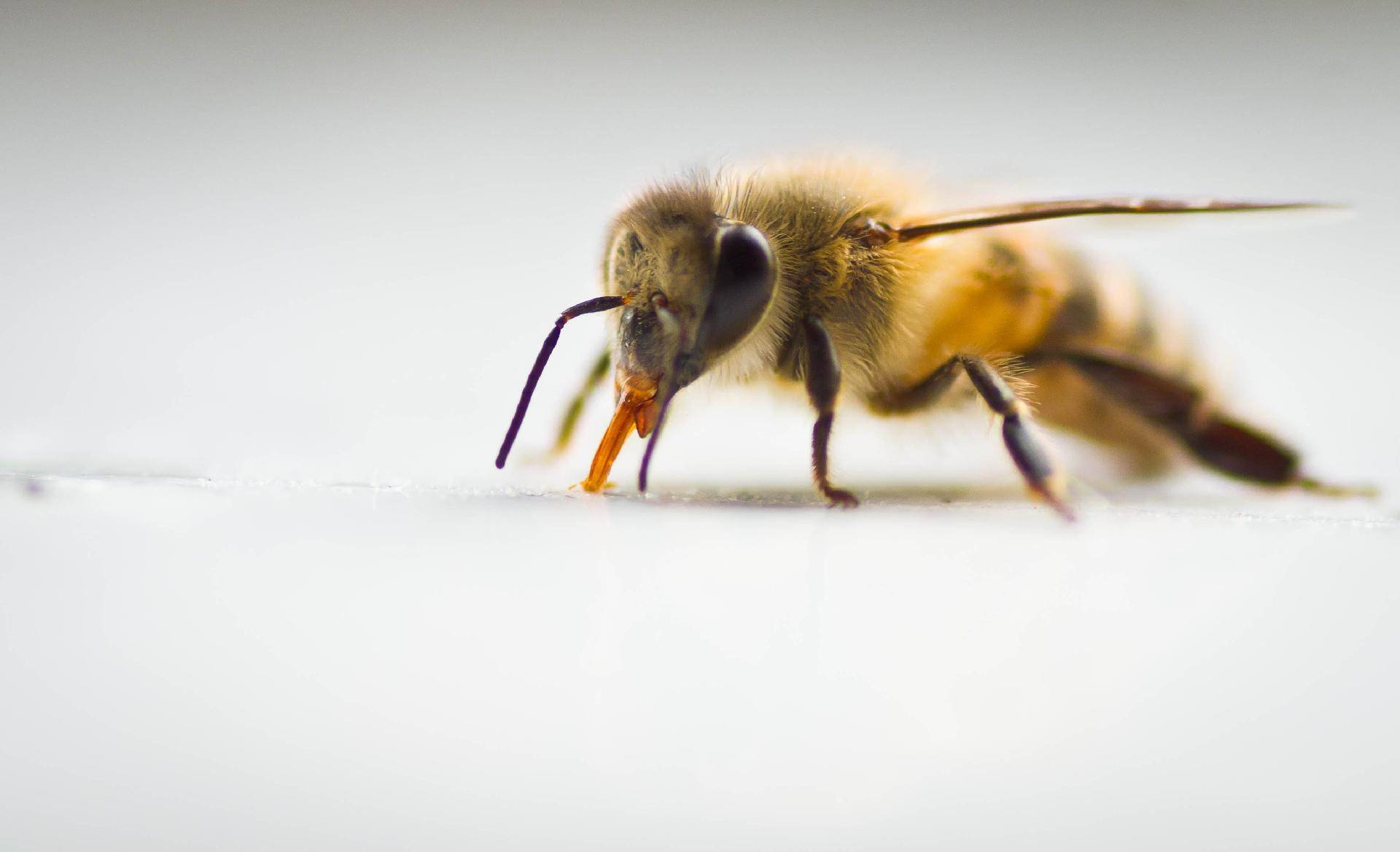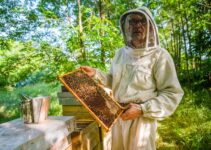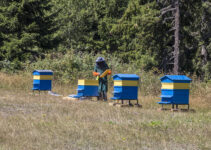One of the things that gives honey bees a bad reputation among those who don’t know a lot about them is their stinger. Honey bees will sting when they are threatened, and that is exactly why a lot of people fear them. So, in a beekeeper’s case, he or she obviously works closely with bees and handles them on a regular basis, which means that a beekeeper will only open him or herself up to getting stung by the bees. But how often do beekeepers get stung?
An experienced and well-protected beekeeper will only get stung maybe about five times in a single year. That’s because beekeepers know how to act around bees so that they don’t get stung. And if the bees even try to sting, an experienced beekeeper knows how to properly use his protective gear to avoid getting stung.
Getting stung by a bee is a fact of life that a beekeeper must accept as early as possible if they want to love what they are doing. However, that doesn’t mean that getting stung doesn’t hurt. It does hurt but a responsible beekeeper has already learned so much that he or she already knows how to avoid getting stung while wearing the appropriate protective gear. That said, it is time for us to get to know more about how often beekeepers get stung by their own bees.
Do beekeepers ever get stung?
Beekeeping is all the rage right now, I hesitate to say it is even fashionable 🙂 OK, maybe the ‘cool kids’ aren’t exactly clambering to be beekeepers, but a lot of other people are. Natural living is becoming more and more important to modern humans, and alongside that is the increase in consumption of things such as organic produce and raw honey. Beekeepers all over the world are feeling the benefits.
But, at the same time, what turns people off from beekeeping is the stigma that comes with being around bees. Let’s face the fact that bees can be quite scary because they are basically flying needles that will sting and hurt you when they have a reason to do so. That’s why plenty of people tend to fear working around bees because they don’t like getting stung.
Of course, you also have to think about the neighbors who might not appreciate having so many bees flying around the neighborhood either! People who haven’t worked closely with bees or are allergic to bee stings don’t like having these flying needles around, I can tell you! And no matter how important bees are to our ecosystem, it still is a fact that they come with needles that they use to defend themselves whenever they are threatened.
So, if that is the case, do beekeepers ever get stung by their bees? If so, what are the reasons why even the beekeepers themselves get stung? And did the beekeepers even know what they were getting into when they decided to follow this endeavor?
The fact of the matter is that beekeepers know this, and they have accepted the fact that they will get stung along the way. And the truth is that any beekeeper will tell you that he or she has actually gotten stung a few times in the past, especially when the beekeeper was still a beginner who did not know how to handle themselves around bees.
So, the reason why even the beekeepers themselves get stung by bees is that bees are just naturally inclined to sting people whenever they feel threatened. Honey bees are defensive creatures that will only sting as a last resort because they have barbed stingers that will get stuck on whatever they end up stinging. When that happens, a honeybee will eventually die as a result of stinging a person. They know this, and that is the reason why stinging is a last resort for a bee.
Going from there, the reason why beekeepers end up getting stung from time to time can be attributed to some simple mistakes they made when they were still beginners or whenever they end up becoming careless around bees. Most of the time, even when bees are flying close to you, they are only doing so out of curiosity and not because they want to sting you. So, when that happens, the best thing you need to do is to stay calm and act normally.
However, when inexperienced beekeepers end up panicking when bees inevitably getting too close to them, the bees will see this as a sign of aggression from the beekeepers. As such, the bees will sense the fear and panic in a beekeeper and will try to defend themselves by stinging because they probably feel that the beekeeper has the intent to harm them or the entire colony.
Also, there are some beekeepers that don’t like working with protective gear, probably because they find it uncomfortable or maybe because they just like working closely with their bees in a way that is as natural as possible. However, while that may be an idealistic way of handling your job as a beekeeper, doing so will only open you up to getting stung by the bees. You have to respect the bees and what they are capable of, and respecting them means that you need to wear your protective gear because you know what they will do if they feel threatened.
So, to sum it up, beekeepers do, in fact, get stung by bees. You will be hard-pressed to find a beekeeper who hasn’t been stung by a bee. It’s part of what makes the job interesting and challenging to the point that it has become quite normal for a beekeeper to face the possibility of getting stung.
How often do beekeepers get stung?
Now that we have established the fact that beekeepers actually do get stung by their bees whenever they are handling them, you might be wondering how often they get stung. After all, beekeepers are always in close contact with beehives that contain thousands of bees. So, how often does a beekeeper get stung?
When you are talking about an established and experienced beekeeper, the likelihood of getting stung is lower compared to that of beginners and inexperienced and careless beekeepers. That said, most of the more experienced beekeepers will probably get stung about a handful of times in a single year, and that is a low number considering that they are always close to their beehives.
Meanwhile, inexperienced beekeepers are more likely to get stung because they aren’t used to doing what needs to be done to minimize the chances of getting targeted by those flying stingers. Moreover, inexperienced beekeepers are still trying to learn more about what it’s like to be a beekeeper. So, in a sense, getting stung should serve as a rite of passage that will make the beginner learn to respect the bees and to try to do whatever is necessary to decrease the chances of getting stung.
That said, while beekeepers are actually working in close contact with beehives on a regular basis, they don’t often get stung by the bees precisely because they already know what they are doing. Of course, they also understand the nature of bees and, in doing so, they have learned the ins and outs of the profession and how to not get stung by these flying needles.
Do beekeepers get immune to bee stings?
While we might have mentioned that beekeepers do, in fact, get stung and are going to experience getting stung by bees maybe five times a year, give or take, do they ever get immune to bee stings? Will someone who has experienced getting stung more than a dozen times end up not feeling anything at all?
Well, the truth is that different people have different pain thresholds and may have different definitions of what is painful or not. For example, there are people who have higher pain thresholds when it comes to blunt forces but end up having low tolerances to needles. There are also those who are vice versa in the sense that they are more tolerant to needles but are more likely to feel more pain when hit with something blunt.
The point here is that we are trying to establish that different people will receive bee stings quite differently. There are those who would say that a bee sting is so painful, while others will see it as a mere inconvenience. And there may even be people who have already gotten used to the pain they feel when they are getting stung by the bees.
So, in a sense, there is no certainty as to whether or not people do get immune to bee stings because we are all wired differently when it comes to pain. Of course, there are also those who are naturally allergic to bee stings and the venom that comes with them. So, those people are less likely to get immune to bee stings.
However, what we can say for certain is that experienced beekeepers have gotten immune to the possibility of getting stung to the point that they no longer fear it. They will still feel pain when they get stung, but they have learned to brush it off as one of the inconveniences and hazards that come with the occupation of working closely with bees. So, in a sense, some people can get immune to bee stings while others just get immune to the daily rigors of being a beekeeper to the point that they no longer mind getting stung even though they still feel the pain.
Can you keep bees without getting stung?
For those who are interested in keeping bees but are just really trying their best to avoid getting stung, is there any way to keep bees without the dangers that come with it? Can you still be a beekeeper without getting stung?
Ideally, it might be possible for you to still keep bees without getting stung. And that happens when you are not the one who is closely working with these bees, such as when you hire people to work for you and they are the ones taking care of the bees and doing the harvesting. So, in that sense, you can still be a beekeeper because you do own and keep the bees in your own apiary, but you are not a beekeeper in the sense that you are not the one tending to those bees.
However, if you expect yourself to do all of the work that a beekeeper is supposed to do but you don’t want to get stung because you are afraid of the pain or because you are allergic to bee stings, then there might be no possible solutions that would help you avoid getting stung.
Ideally, if you do know what you should do to avoid getting stung, you might be able to avoid it. However, beekeepers know for a fact that experience is the best teacher when taking care of bees. And experience walks hand in hand with getting stung by the bees so that you will learn in a hard way how to properly act around the bees and how to avoid getting stung.
So, our point here is that there is no way for you to start your life as an apiarist without getting stung. You are going to get stung along the way because that is part of the experience of what makes a beekeeper a good beekeeper. As such, if you want to avoid getting stung while keeping bees, it might be best to leave the hard work up to people you hired to tend after your hives.
What do beekeepers do to not get stung?
As we said, the experienced beekeepers only get stung a few times a year because they already know what to do when they are around the bees. So, in that case, what do beekeepers do to not get stung? Here is the list of the things that you should do when you want to avoid getting stung by the bees or, at the very least, to minimize the chances of getting stung:
1. Wear your protective gear
We cannot overstress the importance of wearing your protective gear. That is your first line of defense against those flying needles. Of course, we also know how hot and uncomfortable your protective gear can be during a particularly warm summer day. But bear with it, especially if you want to avoid getting stung.
For those who opt to not wear any protective gear or for those who wear minimal protective gear, you should already accept your fate that your chances of getting stung will be higher than those who wear their full gear.
2. Proper hive placement
Knowing where to place your hive will decrease the chances of you getting stung. It is important to situate the hive in an area that is far from people and doesn’t get a lot of foot traffic because this will allow the bees to be less wary of people. So, when you try to handle them or when you inspect your hives, the bees will be less likely to feel threatened by your presence.
3. Work under the right conditions
Bees are creatures that are slaves to the weather. They hate it whenever it’s raining or when the day is too cold and gloomy for them. So, if you were to open the hives to inspect them during a rainy or cold day, your bees will hate it and they might feel that you are purposely threatening their safety. Expect yourself to get stung in such a situation.
As such, use common sense when you are working with your bees. Only work under the right conditions, such as when the day is warm and bright. Doing so will decrease the chances of encountering angry bees in your hive.
4. Try to populate your hives with gentle bees
If you are starting a new hive, go and buy bees that you know come from a gentle line of bees. There are some bees that might be gentler than others because they come from hives that are already used to having a beekeeper around. Meanwhile, bees that are fresh from the wild are more likely to be aggressive because they need to stay on their heels defensively. Humans are weird at first, after all 🙂
5. Always stay calm
Probably the second most important thing you need to do to avoid getting stung is to stay calm. The reason why a lot of people get stung even if they are wearing protective gear is that they are not calm whenever bees get too close. When a bee is close by, it is merely trying to inspect the area out of curiosity. As long as you are not doing anything harmful to the colony, the bees won’t sting you because they know they will die as a result of doing so.
So, in your case, even if the bees are already flying close by, the best decision you can do is to stay calm and to avoid making unnecessary sudden movements that can startle the bees. When you are panicking, the bees will also panic as well. This will make them think that you are out to hurt them. As such, they will sting you as an act of self-defense.
Do you still get stung in a bee suit?
We have established how important the bee suit is at protecting you from bee stings. After all, that is what they were designed to do. But is a bee suit absolute in the sense that it protects you from all bee stings? Can bees still sting you if you are wearing a beekeeper suit?
Yes, you can still get stung if you are wearing a bee suit. That’s because bee suits are designed to help protect you from bee stings by making it more difficult for the bees to penetrate the suit or even get on the suit to sting you. However, most bee suits are not nearly thick enough to the point that they will completely stop a bee sting that has managed to pierce through the outer layer. While bee suits have outer layers that are supposed to be tough enough to prevent a bee sting, there are still some bees that are quite determined to the point that they can pierce through the bee suit.
So, in such a case, when the bee stinger pierces through the fabric, there is a chance that it will reach your skin. But the chances are still slim because bee suits are meant to be loose fitting so that the suit is not in close contact with your skin. Still, that doesn’t completely protect you from an angry swarm of thousands of bees that will try to sting you because the probability that one of those bees ends up penetrating the suit can be high. Of course, there is also a chance that a bee might find an opening into your bee suit to sting you from the inside.
In that sense, a beekeeper suit is not an absolute line of defense, but it is still the best defense that you have against bee stings. And don’t worry because, as long as you are wearing your suit properly and that you know how to act around bees, you will minimize the chances of getting stung.
Sources:
https://beekeeperfacts.com/how-often-do-you-get-stung-beekeeping-how-much-does-it-hurt/
https://www.buddhabeeapiary.com/blog/do-beekeepers-get-stung-often
http://www.beeandbloom.com/blog/fabqs-will-i-get-stung
https://www.wonderopolis.org/wonder/do-beekeepers-ever-get-stung




